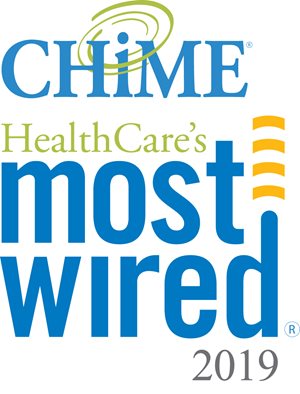LMH Named 2019 CHIME HealthCare’s Most Wired Recipient
 Licking Memorial Hospital (LMH) recently was recognized as one of CHIME HealthCare’s Most Wired Hospitals for 2019. The award honors hospitals and health systems at the forefront of using healthcare information technologies (IT) to improve the delivery of care, have maximized the benefits of foundational technologies and are embracing new technologies that support population management and value-based care. Each year, the survey increases the threshold of its requirements to continually push improvements within healthcare systems.
Licking Memorial Hospital (LMH) recently was recognized as one of CHIME HealthCare’s Most Wired Hospitals for 2019. The award honors hospitals and health systems at the forefront of using healthcare information technologies (IT) to improve the delivery of care, have maximized the benefits of foundational technologies and are embracing new technologies that support population management and value-based care. Each year, the survey increases the threshold of its requirements to continually push improvements within healthcare systems.
HealthCare’s Most Wired, now in its 21st year, traditionally tracked the adoption of healthcare IT in hospitals and health systems. CHIME acquired the Most Wired program and revised the survey questions and methodology to highlight strengths and gaps in the industry. The goal is to identify best practices and promote the strategic use of healthcare IT to elevate the health and care of communities around the world.
“We are pleased to be recognized for a sixth year at the national level for our efforts to improve the health of our community,” said Rob Montagnese, Licking Memorial Health Systems (LMHS) President & CEO. “For a number of years, we have been heavily focused on implementing advanced clinical systems that directly impact the quality of care provided to our patients. Those efforts include adopting technologies to support the instantaneous documentation of patient care, using integrated computer systems with advanced clinical decision support tools, and reducing the likelihood of medication errors through the use of electronic tools such as Computerized Provider Order Entry and Barcoded Medication Verification. Continuing our efforts to integrate top-tier technology is vital to maintaining optimal patient care and we are fortunate to obtain these technologies because of our community’s support.”
Each organization that completed a survey received an overall score, including scores for individual levels in eight segments: infrastructure; security; business/disaster recovery; administrative/supply chain; analytics/data management; interoperability/population health; patient engagement; and clinical quality/safety.
“Research has shown that information technology can be a powerful tool in supporting high quality patient care,” said LMHS Vice President Information Systems Sallie Arnett, M.S., RHIA, CHCIO. “For many years, we have used technology to assist clinical staff in making informed patient care decisions, improving patient outcomes, and reducing medical errors. With the recent introduction of the LMH Call Light System, staff response times are more timely and communication among staff is quicker and more effective for a patient’s needs.”
LMH provides digital diagnostic images from Radiology, Cardiovascular Imaging, Mammography, Neuroimaging and Nuclear Imaging to the appropriate care provider regardless of the provider’s location, and integrates those images with the electronic medical record (EMR). Voice communication using the unique hands-free Vocera devices, worn by nearly every member of the clinical staff, occurs over the secure wireless network. In addition, Vocera devices allow patients to communicate directly with nurses by activating the nurse call button. LMH also utilizes patient monitoring equipment which sends data directly into the EMR, including bedside blood pressure, pulse oximetry, temperature, glucose, lab tests and fetal monitoring.
Information security also has been a key focus of the Information Systems Department at LMH in recent years. The Information Security team is focused on the confidentiality, integrity and availability of patient information. “We respect the privacy of our patients’ information and do our best to ensure that our information systems remain private, the information contained within the medical record is accurate, and that our systems are operating at peak efficiency for patient care,” Sallie added.
The annual survey is designed to measure the level of IT adoption in U.S. hospitals and health systems, and serves as a tool for hospital and health system leadership to map their IT strategic plans. The four focus areas of the survey include: infrastructure and security; business and administrative management, clinical quality and safety (inpatient/outpatient hospital) and clinical integration (ambulatory/physician/patient/community). According to the survey, hospitals are ramping up their efforts to stop hackers and also working to boost their capabilities in telehealth and population health. There also has been an increased emphasis on clinical staff training.
About CHIME
The College of Healthcare Information Management Executives (CHIME) is an executive organization dedicated to serving chief information officers (CIOs), chief medical information officers (CMIOs), chief nursing information officers (CNIOs) and other senior healthcare IT leaders. With more than 2,700 members in 51 countries and over 150 healthcare IT business partners and professional services firms, CHIME provides a highly interactive, trusted environment enabling senior professional and industry leaders to collaborate; exchange best practices; address professional development needs; and advocate the effective use of information management to improve the health and healthcare in the communities they serve.